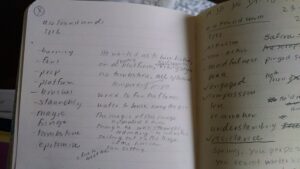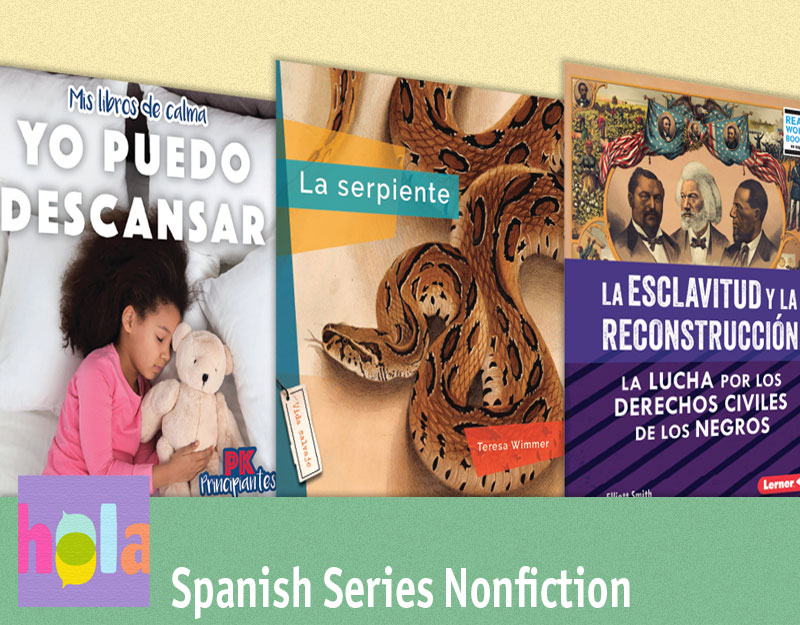For National Poetry Month: A Social Justice Poetry Project for Teens, a guest post by Laura Shovan
 Well. Here we are, educators and librarians. The teens we work with are consuming the same polarizing news media, current events stories, and government spin that we adults struggle to cope with every day.
Well. Here we are, educators and librarians. The teens we work with are consuming the same polarizing news media, current events stories, and government spin that we adults struggle to cope with every day.
How can we help teens interact with the news in a way that gives them some control over the language and information we’re being bombarded with?
One answer is poetry.
Over the past few months, I’ve resisted the urge to disengage from the language being used by government and media. Instead, I’m looking at that language as a poet — creating found poems to reflect what’s happening in our country and world.
ADVERTISEMENT
ADVERTISEMENT
A few days before our 45th president’s inauguration, I found I could not watch his press conference. My feelings about and reactions toward Trump were still too raw. I had to find a way to interact with his words that felt safe, but allowed me to digest their meaning.
I turned to poetry, printing out the text of the press conference and highlighting key phrases. The result was a found poem in Trump’s own words.
The idea worked well enough that I borrowed it for the daily write-in I host each February. My goal was to help people stay aware of how language is being used in the current political climate, a skill that is crucial for teens as well as adults.
Whether you’re working with a teen writing club that meets once a month, a weekly poetry class, or a high school social justice committee, this exercise is adaptable for your group. It would make a great National Poetry Month project.
The prompt combines found poetry, current events, and a writing exercise from poet Grace Cavalieri entitled “10 Little Words.”
 Each day of the project, one member of the group chooses a news article. From that source, he or she pulls out 10 words. The task is to write a poem (or flash prose piece) using all, or most, of the day’s ten words.
Each day of the project, one member of the group chooses a news article. From that source, he or she pulls out 10 words. The task is to write a poem (or flash prose piece) using all, or most, of the day’s ten words.
What I like about this prompt is that it provides both structure and options. The ten words function like a vase, containing the poets’ raw emotional response to the news and giving it shape. But there’s also freedom to play with the words and make personal connections.
The best part of this current events/found poetry project is how it encourages engagement with the day’s news on a deeper level. Instead of reading and shaking our heads at injustice, writing a poem in response to the news encourages critical thinking and creativity. During difficult times or experiences, making art can help teens (anyone, really) gain an important sense of perspective.
Some tips on doing this project with teens:
It’s good to have a variety of topics. We all need occasional breaks from politics. Encourage each member of the group to take charge of the source and word bank for one day. The adult poets I worked with selected a variety of articles: political stories, science news, and social justice in the arts.
ADVERTISEMENT
ADVERTISEMENT
Reiterate that this exercise is about writing in community. In my February project, we post a prompt, write our response poems, and share them on a group page all on the same day. Everyone is generating new writing and ideas, so feedback is positive and supportive. The best surprises come from all the different interpretations of the day’s 10 words.
Some questions that might come up are:
Do I have to use all ten words? Can I use five?
I recommend poet’s choice.
Do I have to use the word as it’s listed?
Any delineation of the word is fine. Feel free to play. For one of the prompts, I turned “cash” into “cashew” because that suited my poem
Here are two sample prompts — with response poems — from the
2017 February Poetry Project.
Poet and librarian Diane Mayr chose our source and words on February 12.
10 Words of the Day: burning, fans, prop, platform, brushes, staunchly, magic, fringe, tombstone, epitomize
J.K. ROWLING RALLIES FREEDOM VIA TWITTER
J.K. Rowling’s magical brushes
turned tainted Twitter fans into foes.
Tweets of burning books abound,
but Rowling’s focused on
flushing out autocrats via free speech.
With her final books published,
her political platform propped into place.
Petitions of Trump’s U.K. visit piled high,
inviting Rowling’s staunch reaction —
come “be offensive and bigoted” here,
your “freedom to speak protects my
freedom to call” you “a bigot.”
Christian criticism, bah.
Read the tombstone of Albus Dumbdore’s kin
a bit deeper, dear reader . . .
“Where your treasure is,
there your heart be also.” Mathew 6:19.
“Freedom of speech” represents
the epitome of Rowling’s heart,
freedom for all, for the fringes of society,
the unspoken, the
have-nots!
BOOK BURNING
By Patricia Jakovich VanAmburg
Atop the platform of
Staunch self-righteousness
Books are burning—
Breath from hot zealots
Fans their flame—
When books are fringe
Magic brushes portals
Unlocking possibility—
Drop a tombstone amid
Whatever remains—
Chisel these words:
Suppression Epitomizes Idiocy
WAITING
by Charlie Otting
A young boy
Stands on the train
Platform, his forehead
Burning, his suitcase
Propped against his leg
The crowds brush by
Him as he stares
Staunchly at
The brick wall
The ceiling fans give
Barely a breeze –
The screech of steel
On steel is deafening
But around him
The air is silent
As a tombstone
He can feel
The magic
On the fringe
Is that what the scar
Epitomizes?
On February 9, poet and educator Mary Lee Hahn found our source and ten words. Instead of creating a bank of selected words, Mary Lee gave us an eleven-word sentence to use as a writing prompt.
10+1 Words of the Day: “They can shut me up, but they can’t change the truth.”
Source: “Warren cut off during Sessions debate after criticism,” by Ted Barrett, CNN, February 8, 2017
TRUTH UP
By Laura Shovan
They can’t change truth,
shut up change.
Truth can’t shut up.
They can’t change me.
Truth can,
but they can’t.
Me? The truth?
Can’t shut up.
They can change.
IRRELEVANT
by Kip Wilson Rechea
The door slams shut behind me
with a loud, echoey bang
but I can’t wait
to put everything behind me
except the sound
of my own breath bubbling up
to the surface
as I stroke, stroke, breathe
my way across the pool
because my truth is found here
in thoughts clear
as chlorinated water.
Additional resources:
The New Verse News: E-zine with daily current events poems
Split This Rock: Social justice and poetry non-profit
Meet Laura Shovan
 Laura Shovan’s middle grade verse novel, The Last Fifth Grade of Emerson Elementary, is about students protesting the closure of their school. It was a NCTE 2017 Notable Verse Novel and won Cybils and Nerdy Book Club awards for poetry. Laura is a Poetry Friday blogger and longtime poet-in-the-schools for the Maryland State Arts Council. She is also the author and editor of three books of poetry for adults. Visit her at: www.laurashovan.com.
Laura Shovan’s middle grade verse novel, The Last Fifth Grade of Emerson Elementary, is about students protesting the closure of their school. It was a NCTE 2017 Notable Verse Novel and won Cybils and Nerdy Book Club awards for poetry. Laura is a Poetry Friday blogger and longtime poet-in-the-schools for the Maryland State Arts Council. She is also the author and editor of three books of poetry for adults. Visit her at: www.laurashovan.com.
Filed under: #SJYALit
About Amanda MacGregor
Amanda MacGregor works in an elementary library, loves dogs, and can be found on Twitter @CiteSomething.
ADVERTISEMENT
ADVERTISEMENT
SLJ Blog Network
One Star Review, Guess Who? (#202)
Review of the Day: My Antarctica by G. Neri, ill. Corban Wilkin
Exclusive: Giant Magical Otters Invade New Hex Vet Graphic Novel | News
Parsing Religion in Public Schools
ADVERTISEMENT







